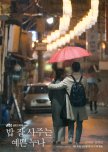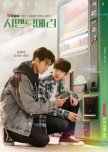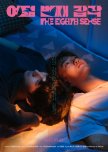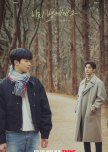
Something in the Rain
2 personnes ont trouvé cette critique utile
Cette critique peut contenir des spoilers
Pulls a strong emotional punch
This Kdrama absolutely pulls at the heartstrings all the way though. Initially we are drawn into the unfolding romance between the leads which is light , playful and a delight to watch. About half way though, the tone begins to change, as the characters encounter fierce opposition from all quarters and don't have the strategies or an ability to communicate with each other in a way that helps them to resolve it.The acting is outstanding from all players, and the camera work is so loving that each scene feels beautifully shot and intimate.
Anyone watching this for a sure romance will be disappointed, because the real story in this drama is the strong commentary on traditional Korean society. This drama explores the devastating impacts of parental pressure on the choices children have. We are shown two parenting styles - one who is uninvolved and neglectful and the other overbearing and controlling. Both end up playing emotional havoc on their children rendering them incapable of taking full responsibility for their lives. The journey of Jin Ah, in the lead female role, is to free herself from the grip of family and work so that she can grow into an independent self-determining adult. This journey is hard won, and painful to watch.
Because this is a romance, we know there will be a happy ending. However, the happiness achieved is undercut by what the characters will have to leave in order to achieve it and for this reason their future lives together feels hopeful rather than assured. I loved this kdrama for this complexity, and for the questions that linger long after I finished watching it.
Cet avis était-il utile?

Sweet take on neuro-diversity
I really liked this drama for its handling of romantic love and neuro-diversity. It's pretty clear that Sang Woo is on the autism spectrum. Every detail to signal this has been provided - the fact he needs routine, order and predictability, his tactile defensiveness (hates being touched unexpectedly), the smart guy who treats people like objects - it's all there but it's done in such a way that it is not necessary to label him on the basis of it. Instead, the direction seems to have an enjoyable and affectionate take on many of his "robotic" mannerisms, providing a lighter and less stereo-typed take on difference.Sang Woo has to grow the most - he has to become flexible and allow himself to love and in this way, he is able to find his place in the world and someone to be with in it.
There's a real sweetness to this drama, and sincerity which makes it feel fresh despite it covering all the usual themes. This is a BL drama and just like with the theme of neuro-diversity, the attraction of these 2 leads needs no explanation or defending to anyone. They are just who they are, doing what they do, and everyone goes along with it.
Conclusion: easy to watch and a nice bite sized binge for a rainy afternoon.
Cet avis était-il utile?

Sensing what's happening inside
The title of this K-drama sets the theme for the journey of these characters. Most of us think we have 5 senses, but in fact we have 8, and the final sense is the ability to feel what is happening inside ourselves. It's the ability to feel our heart beat, our breath come in and leave the body, and feel how our emotions are experienced within the body - the heaviness of our heart, adroop in our shoulders, a tightness in our throats - all these sensations inform us of our emotional and mental states.
How do we work with our emotional states? How do we make sense of the unpleasant ones? Do we try to avoid them, ghost them, run away, or do we understand that fear and risk are a natural part of the human experience and learn to feel them, how to be with them? This is the crux of this intricately woven story.
All the senses are in sharp focus in this drama. Through some scenes which are shot with a handheld camera, we feel our sese of balance and gravity challenged. Close ups of food awaken our sense of taste, the sensuality of touch is explored in some of the more intimate scenes, and every scene contains shots of breathtaking cinematography, where colours shine in dull settings. We become aware of sound, as the soundtrack dips in and phases out, background noises can be filtered out or left in, there are long periods of silence too, where quiet becomes a sound of its own. There is innovative use of camera work and filters, sometimes light, sometimes dark, sometimes the focus is on the characters and the background blurred, it's daring and experimental and ever changing, just like the nature of how we sense our experiences, an ever changing kaleidoscope of awareness.
The plot moves with pace, but nothing is rushed, and sometimes the story line leaves us bereft and shocked, but the final episode pulls everything back into a slow unfolding, restoring and completing and then opening out again into this great mystery of human experience.
One of the major themes of this drama is liminal spaces and life transitions. We have one set of characters transitioning from adolescence to adult hood as they begin their university studies, the other set of characters prepare to leave and enter the workforce. Each requires a letting go of the old and stepping into a new phase of life. Working with loss and letting go, taking chances and risks with the new is explored by all the characters to some degree. It is no surprise then that many of the crucial scenes take place in a beach setting, which is a threshold place between the solid and known land, and the wild unknown sea. Across many cultures, water is a symbol of the unconscious mind. We cannot penetrate its depths but can only move with it. This is a story about working with the forces within us, both known and unknown.
This is a K-drama unlike any other and moved me like no other. It's left me with a sense of challenge to navigate my own life transitions, my own fears, with as much internal awareness as I can.
Cet avis était-il utile?

What it means to be human beautifully captured
Easy to watch, easy to become engrossed in, easy to relate to. That's why I enjoyed this K-Drama so much.All of us are hurt at some point in our lives, all of us know the feeling of needing to protect ourselves from pain and the vulnerability that comes from our longing for connection and the fear of its loss. This story beautifully weaves threads around this most basic human need into a rich tapestry of human experience.
We know from the very outset that the happy ever after from season 1 did not stay that way. What follows is an exploration of vulnerability. Past losses and rejections, trauma, all leave their mark and condition the way the leads relate to their lives and each other. The drama unfolds as a dance, as each character steps forwards and then retreats, not sure how to be together.
It has it all, great chemistry between the leads, tender moments, pain and heart break, frustration at the lead for being his own worst enemy and a generous amount of affection to leave the ending fully resolved.
Cet avis était-il utile?


